

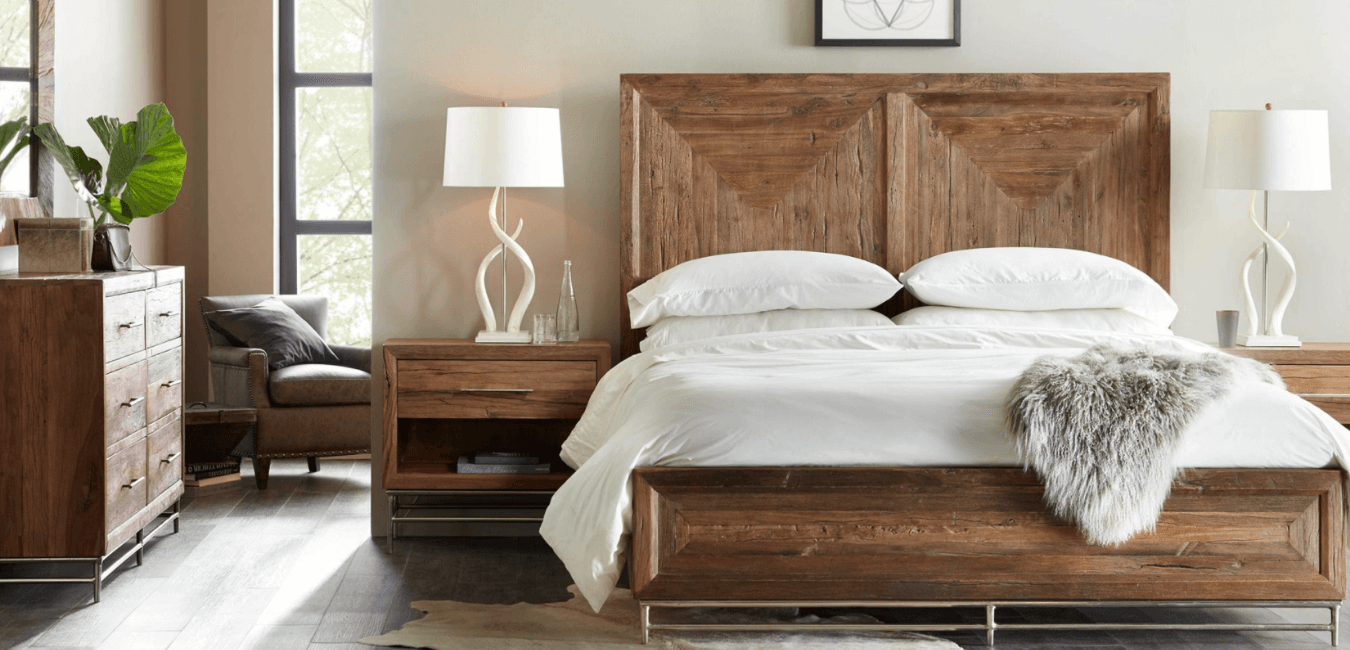
Hooker Furniture L'Usine Bedroom Set from LuxeDecor
Pasting lemon print wallpaper in the kitchen and adding indoor-outdoor fabrics in the living room are two fun ways to update interiors for Summer months. While these alterations are certainly enjoyable and refreshing, one must also implement functional changes to cool each room. Homeowners hang opaque, lightweight curtains to block the sun and attach weatherstripping to door jams to hold in expensive air conditioning. Renters envelop leather or vinyl couches and armchairs in breathable slip covers to prevent legs from sticking to furniture. Perhaps no choice is more effective or more important — however — than picking the perfect sheets, blanket, duvet cover, comforter and pillowcases for keeping residents cool while they sleep. Follow below for our buying guide on choosing the best bedding for Summer to keep you cool and more information about how hot nights impact sleep quality.
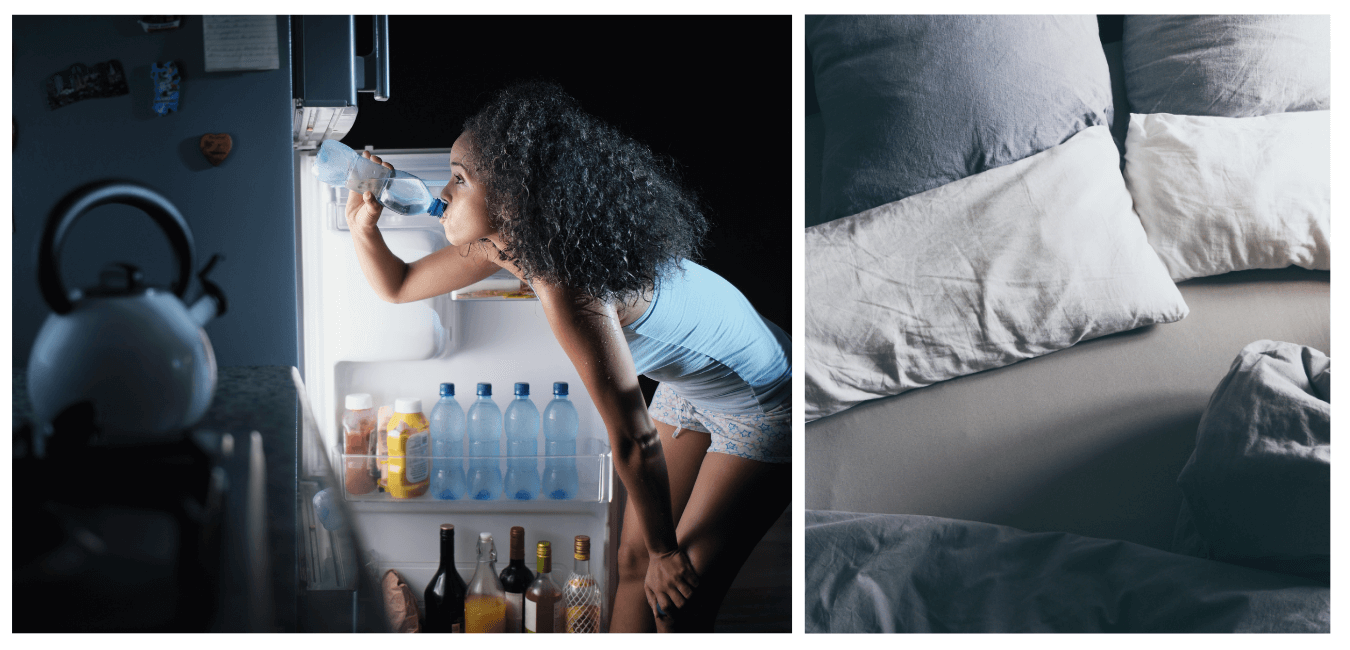
Night sweats, skin reactions and interrupted sleep are all side effects of struggling to sleep well during hot nights. Carolyn Steber explains a few of these impacts in her article “Yes, Heat Can Affect Your Sleep — Here's How Your Body Reacts” for Bustle. Steber writes that “even though it feels great to climb into a warm bed, sleeping in a hot room can impact the body in a way that makes it difficult to get good rest.” The need for a stable temperature around seventy-two degrees Fahrenheit is not just personal preference — it is a biological imperative, writes Steber. To support her claim, Steber quotes Dr. Sujay Kansagra who works as the director of Duke University’s pediatric neurology sleep medicine program. Dr. Kansagra notes that while rooms that are too cold can affect the quality of sleep, heat is much more disruptive.
Dr. Kansagra explains that not only do cooler temperatures help our bodies “transition from an awake state to a sleep state,” but they also help our minds and bodies stay asleep through the night. An uptick in temperature can confuse the body and its internal thermostat, coaxing a sleeping person back to a waking or semi-woken state. Kansagra tells Steber that heat can also affect the body physically while at rest, as a “warm room can lead to sweating and other sleep disruptions throughout the night, even if you don't feel hot when you're drifting off.”

Unfortunately, the unpleasant side effects of sleeping hot are not limited solely to the nighttime hours. Consequences can follow those experiencing interrupted sleep well into the next day — or even longer. In their 2019 study “The Effects of High-Temperature Weather on Human Sleep Quality and Appetite” for the International Journal of Environmental Research and Public Health, researchers Guozhong Zheng, Ke Li and Yajing Wang explain immediate consequences. The researchers found that appetite was suppressed the following day and sleep quality was reduced when participants were subjected to high heat during the night. They found that “temperature had significant effects on sleep calmness, difficulty in falling asleep, sleep satisfaction, and sleep adequateness.” For appetite,” the studies “results indicated that high temperatures mainly led to a reduction of appetite at lunchtime.”
Long-term consequences of poor quality sleep are more insidious, writes Dr. Carl Rosenberg in his article “10 Effects of Long-Term Sleep Deprivation” for Sleep Health Solutions. Dr. Rosenberg notes that “an ongoing lack of sleep has been closely associated with hypertension, heart attacks and strokes, obesity [and] diabetes.” It has also been tied to “depression and anxiety, decreased brain function, memory loss, weakened immune system, lower fertility rates and psychiatric disorders.” However, even short-term consequences can have enormous impacts on daily life — affecting work and relationships in children, teens and adults. Dr. Rosenberg notes that “after just one unrestful night, [we experience] mental fog, fatigue, short temper and lack of focus.” Thankfully, choosing the best bedding for Summer — with moisture-wicking capabilities and lightweight fabric — can mitigate these side effects and protect the quality of sleep night to night.
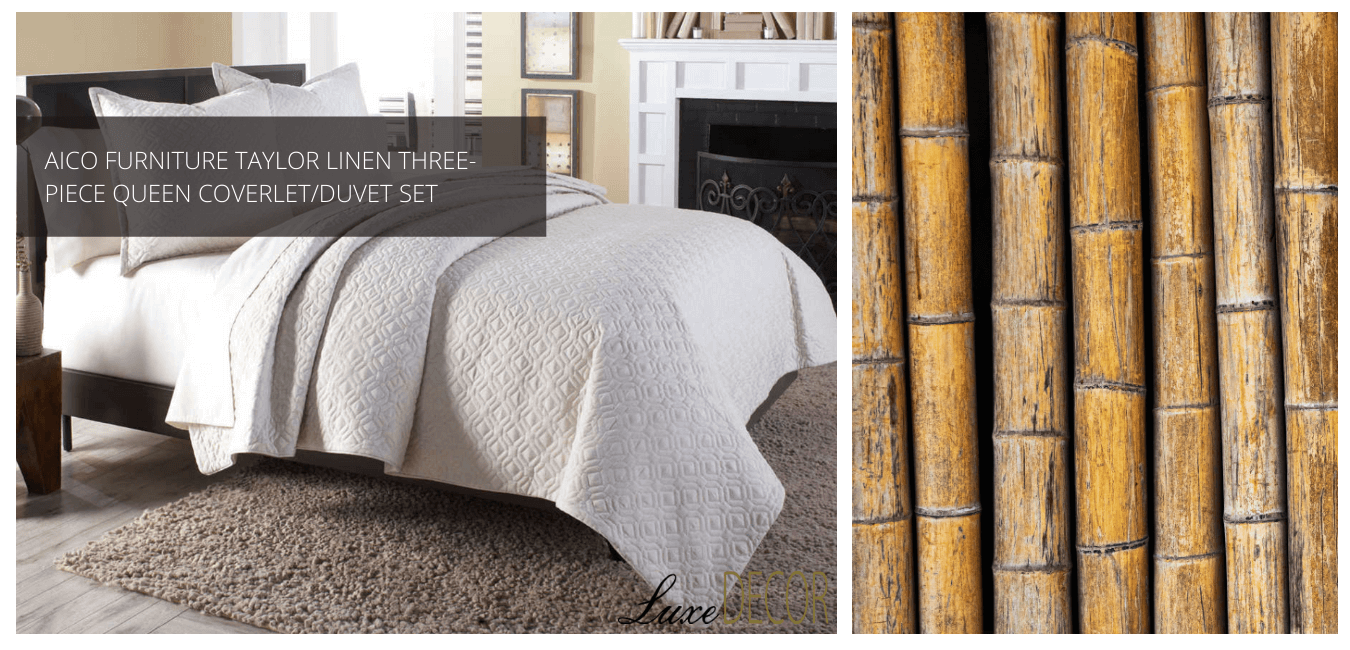
The AICO Furniture Taylor Linen Three-Piece Queen Coverlet/Duvet Set from LuxeDecor is made from 36% viscose.
Comforters constructed from different materials than those usually found in bedding are often more lightweight, moisture-wicking and comfortable during hot months. While fluffy down comforters and silken sheets are perfect for winter months, they are not as suitable for warm nights. Comforters constructed from different materials than those usually found in bedding are often more lightweight, moisture-wicking and comfortable during hot months. While fluffy down comforters and silken sheets are perfect for winter months, they are not as suitable for warm nights because they drape over the body and add extra weight. In her article “What Is the Difference Between a Down and a Down-Alternative Comforter?” for SF Gate, Kathy Adams extols the many benefits of comforters made from natural materials. She writes that “synthetic fillings such as polyester do not breathe as well as natural fibers.” As such, synthetic comforters “may make you feel clammy or sweaty after resting beneath for a while.”
Dermatologists and sleep experts tend to recommend comforters made from viscose — a product of bamboo. Daniel Noyed writes about bamboo sheets in his article “Best Cooling Comforters” for The Sleep Foundation. Noyed notes that “viscose from bamboo is a highly valued fabric among hot sleepers [because] the material retains the natural breathability and cooling of bamboo while also providing a luxuriously soft feel that rivals silk.” Down alternative comforters are another option for hot sleepers, write Sanah Faroke and Lauren Bedosky in their article “12 Best Comforters for Hot Sleepers in 2021, According to Reviewers” for Prevention. Faroke and Bedosky write that down alternative comforters are “perfect for all seasons” year round. They recommend the material because it can “prevent overheating and is perfectly weighted to keep you cozy and comfortable.”
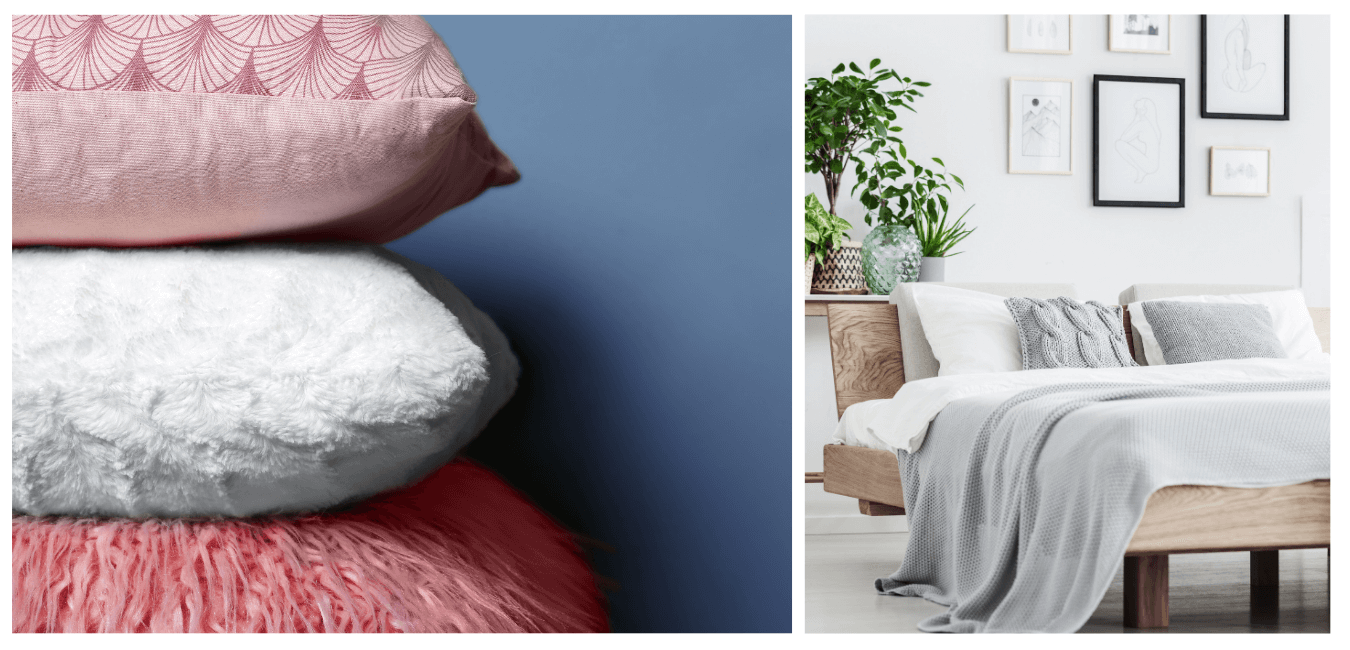
Airflow is key to maintaining a cool, comfortable bedroom during the Summer. While attractive and cushioning, throw pillows add too much bulk and inhibit too much airflow to make sense when one is trying to sleep. Dense, upholstered throw pillows not only inhibit airflow, but they also crowd the body during sleep, trapping heat and moisture against the skin. Stay cool all night long by placing bed-top throw pillows on the floor or an armchair before nodding off to sleep.

The AICO Furniture Ultra Grey Seven-Piece Queen Duvet Set — pictured on the left — and the AICO Furniture Crestwood Denim Seven-Piece Queen Duvet Set — pictured on the right — are both made from 100% cotton and available through LuxeDecor.
Duvet covers can make a bedroom given the large amount of square footage they inhabit within a space. Whether crisp and clean in a bright white or bold and whimsical in an array of colors, duvet covers make a statement. While beds are often spare during the Summer months to avoid overheating during the night, new technologies and a series of fiber innovations have allowed homeowners to keep certain gorgeous duvet covers on the bed year round. In her article “The 4 Best Cooling Duvet Covers” for Bustle, Rachel Cavanaugh recommends tossing aside your satin comforter and turning towards naturally sourced cotton or bamboo duvet covers. She writes that bamboo rayon is a “great choice because it has natural moisture-wicking properties that soak up sweat and help keep you cool.” Percale woven cotton duvet covers are ideal for hot sleepers because cotton “tends to offer the best ventilation." Percale woven duvet covers "tend to be more breathable” and are the best bedding for summer.
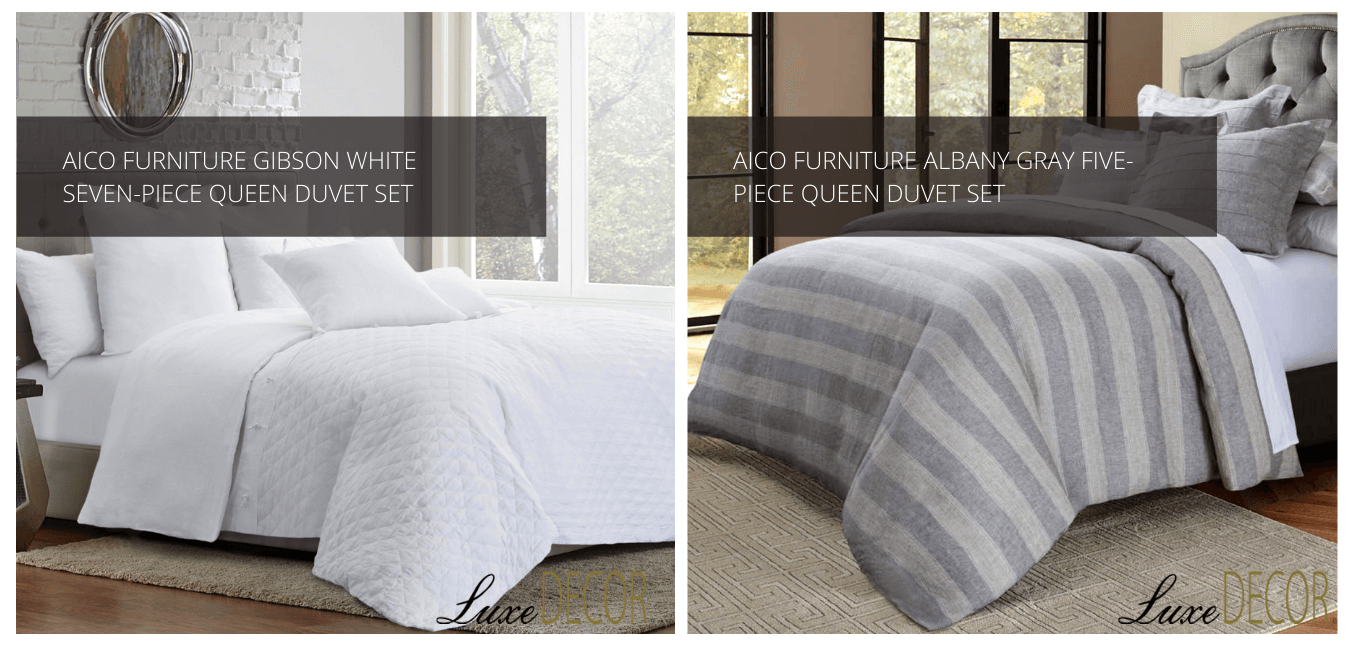
The AICO Furniture Gibson White Seven-Piece Queen Duvet Set — pictured on the left — and the AICO Furniture Albany Gray Five-Piece Queen Duvet Set — pictured on the right — are both from LuxeDecor and made from 100% linen.
Contrary to popular opinion, silk does not actually cool the body — despite its delicate, slippery feel. As such, silk and satin are poor choices for summer sleep. Candace Osmond explains in her article “What is the Best Material for Sheets to Keep You Cool?” for The Sleep Judge. Osmond writes that “silk is the kind of fabric that feels extremely cool to the touch…[but] silk also has the property of absorbing heat.” After this heat is trapped under silk sheets, “it will create a warm barrier around your body, which is something that you want to avoid if you are a hot sleeper.” Linen — on the other hand — natural regulates temperature while wicking away moisture for a lightweight feel.
In fact — notes Maria Cassano in her article “Why Linen Sheets Are Your Skin-Cooling Best Friend During a Heat Wave” for Allure — linen wicks away “moisture better than cotton.” Quoting Vicki Fulop — the CCO of Brooklinen — Cassano writes that linen also has "’a weave that allows for more airflow and an ultimately cooler sleep.’" Linen is exceptionally breathable due to the “increased airflow” offered by its open weave. As such “it's likely the best choice for someone who tends to overheat at night, but still prefers the feeling of something draped over them while sleeping.” Keep in mind that thread count is not nearly as important as material and construction when choosing quality sheets for the summer. Instead, opting for natural fibers like linen is key to choosing the best bedding for summer.
To set the best possible conditions for quality sleep during stuffy summer nights, opt for a down-alternative comforter and toss aside extra throw pillows. Pick out a moisture-wicking duvet cover and choose linen sheets for the best bedding for summer. If a good night’s sleep remains evasive, consider popping sheets and pillowcases in the freezer before bed, drinking a cold glass of water or keeping a damp washcloth on the nightstand.



